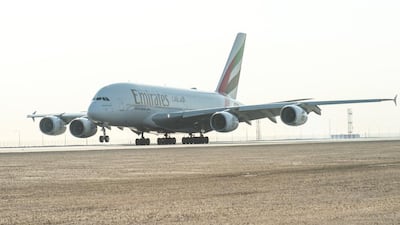Emirates, the largest operator of wide-body aircraft that include the Airbus A380, whose future is in question, is considering various aircraft models to add to its fleet as it looks to retire planes, the carrier's president said.
"The 380 is not the only thing in the frame. We're looking at the A350, the 787 and the 777X which is coming in, in the early part of 2020," the Emirates president Tim Clark said in an interview with The National.
In June, Bloomberg reported the Dubai-based carrier was in talks to buy 20 A380s in a deal worth about US$8.7 billion, according to list prices before discount. An order of 20 Boeing 787 Dreamliner planes is valued at about $5.4bn according to list prices. Boeing's order book as of July 4, lists an order for 30 planes from unidentified customer(s). An order of 30 planes is worth about $8.1bn.
Mr Clark refused to comment on the number of planes up for purchase.
"We are actively working with Emirates to support their fleet expansion, however we cannot comment on any specific campaign," said Boeing spokesman Fakher Daghestani.
The 787 family would provide Emirates with "regional flexibility to deploy lower capacity airplanes compared to the A380, 777-9 and 777-300ER on routes that do not require it, while also allowing Emirates to use them on longer and thinner routes too," said Saj Ahmad, chief analyst for London-based Strategic Aero Research.
Given the changing market dynamics in air travel and the global economy, Emirates may find it makes more sense to lean towards the 787 because of its fuel efficiency, which is an issue of contention at the moment between the carrier and the Toulouse-based manufacturer.
Choosing the 787 would complement the carrier's firm order for 150 777XS, the additional 50 options for the plane that will replace the fleet of 777-300ERs and 777-200LRs. After cancelling a $16bn order in 2014 for 70 A350 its seems unlikely the carrier would order the aircraft again.
Although Mr Clark says the carrier is committed to operating the A380 and it currently has 95 in its fleet with another 47 on order, the survival of the aircraft is in question with a lack of enthusiasm from other airlines.
"Airbus has been talking to us over the last few years about seeing how we can work together to extend the programme. Obviously they're interested in us buying more of them. That dialogue continues with Airbus," said Mr Clark. "Our recommendation to them most strongly is to try and get out and sell it to carriers who ordinarily would have been interested in something like this, but these days it doesn't seem to be too much appetite for it. It's a bit paradoxical that I should be encouraging carriers who are the competitors of Emirates to buy planes."
There are currently only 12 other carriers besides Emirates that operate the A380; Singapore Airlines which runs 19, Lufthansa 14, Qantas 12, British Airways 12, Air France 10, Korean Air Lines 10, Etihad Airways 10, Malaysia Airlines six, Qatar Airways eight, Thai Airways six, China Southern Airlines five and Asiana Airlines six.
The A380 has no future, according to Mr Ahmad. "It is dead for all intents and purposes. It's not just the poor interest from airlines, it is technologically inferior to the likes of the 777X and 787, it has some of the oldest engines for a wide-body in service, it is expensive to operate, hard to fill and is rightfully going to die as a programme because the orders it has are going to evaporate once Emirates inducts its last batch."
Richard Aboulafia, an aviation analyst with the Virgina-based Teal Group agrees. He believes the fate of the A380 is in the hands of Emirates. "If Emirates can't take one [plane delivery] per month – and right now they can't – the A380 will die in a few years. This is purely an Emirates decision. Nobody else has been able to make this plane work, and Airbus is not in the business of keeping cold production lines alive."
The lack of a secondary market for the superjumbo also does not enhance the viability of the aircraft in the future.
"There is a paradigm shift in the way demand patterns are shifting in the region and internationally," said Mr Clark. "There's a lot going on and we've got to keep a wary eye on how these manifest themselves in demand for air travel...it's very difficult for anybody and I mean anybody whether you're an investment banker, an economist, the governor of the Bank of England to be able to say what is going to happen to the global economy, the regional economy in the next three to five years."
In the long term, the travel industry will continue changing radically with narrow body planes being used for long-haul flights, prices falling and becoming more affordable. Turkish Airlines has deployed its narrow body fleet to service Africa, while Norwegian Air Shuttle plans to use A321LRs and the 737-Max on transatlantic routes.
"When you look at the likes of Norwegian and others coming to markets with long-haul low costs picking off second and third-level city-paired combinations in various parts of the world, that is also changing our international travel. I think it's all for the best," said Mr Clark.
"It's going to be wonderful for consumers; because the choices are going to increase, the price is going to fall, albeit you won't have the luxury of a full service airline, but if you're prepared to put up with it, you'll get from A to B over long haul in a very affordable manner."

